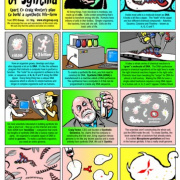Los microbios salen de la Caja de Pandora
Submitted by ETC Staff on
El Grupo ETC apelará legalmente contra las patentes sobre “Sintias” (Organismos vivos sintetizados en laboratorio)
Diez años después del nacimiento de Dolly, la oveja clonada, el Instituto J. Craig Venter ha solicitado una patente sobre una nueva bomba biotecnológica: la primer especie hecha completamente en un laboratorio. Se trata de una bacteria construida totalmente con ADN sintético.
El Instituto Venter —que toma el nombre de su creador y financiador, J. Craig Venter, el científico que encabezó el sector privado en la carrera para mapear el genoma humano— ha solicitado patentes en todo el mundo sobre lo que ha bautizado como “Micoplasma laboratorium”. El Grupo ETC apodó a este organismo sintético, “Sintia”.
Synthia’s last hurdle?
Submitted by ETC Staff on
Synthia, the (theoretical) human-made synthetic microbe – still barely a twinkle in J. Craig Venter’s eye – may be in search of a surrogate micro-mom sometime very soon. According to a research report released today in Science magazine, Synthia (the subject of a patent application discovered by ETC Group a few weeks ago -see “Goodbye Dolly -- Hello Synthia!”) may have overcome her last hurdle. The report, authored by Craig Venter and his colleagues at Synthetic Genomics Inc., claims to have inserted a foreign bacterial genome into the cell of another bacterial species. Nobel laureate Hamilton Smith who is one of Venter’s co-authors in the research article told a meeting of synthetic biologists in Zürich on Monday that this represents a significant step en route to building a whole new life form. As the article itself concludes, “…we have discovered a form of bacterial DNA transfer that permits … recipient cells to be platforms for the production of new species using modified natural genomes or manmade genomes…”
¿Soberanía alimentaria o Revolución Verde 2.0?
Submitted by ETC Staff on
El Grupo ETC publica en español el Communiqué de 16 páginas ¿Revolución Verde 2.0 para África?, describiendo cinco nuevas iniciativas para “mejorar” la agricultura en ese continente.
Los proyectos principales son la construcción de cuatro centros de excelencia agropecuaria y la fuerte inversión de las Fundaciones Bill and Melinda Gates y Rockefeller en una “Alianza para una Revolución Verde en África”, AGRA por sus siglas en inglés.
News Release from the Galapagos National Park re: Planktos
Submitted by ETC Staff on
The Galápagos National Park (entity in charge of managing and administering the two protected areas of the Galápagos Archipelago), is concerned with the US Company Planktos and its plans to experiment in waters near the Galápagos Marine Reserve. For this reason the park has been examining data to stop the Planktos experiment, which could affect the fragile ecosystems of the Galápagos Islands, declared a UNESCO World Heritage Site.
¡PATENTE REVOCADA! El monopolio de Monsanto anulado en Munich
Submitted by ETC Staff on
Munich. La Oficina Europea de Patentes (EPO) puso un alto a la avaricia corporativa de Monsanto el 3 de mayo 2007, al revocar su patente total sobre los frijoles de soya genéticamente modificados (EP0301749), una patente sin precedentes por su increíblemente enorme alcance. El Grupo ETC, organización de la sociedad civil con sede en Canadá, ganó la batalla legal contra Monsanto después de 13 años, contra una patente de especie sobre los frijoles de soya, cuando la EPO sentenció que la patente no era nueva o suficiente (es decir, el paso inventivo argumentado no era lo suficientemente claro o contundente para que un especialista pudiera reproduciro). La demanda contra la patente estuvo respaldada por Greenpeace y por la red europea No Patents on Life. La Dra. Ricarda Steinbrecher de Econexus, con sede en Reino Unido, se unió al equipo contra la patente como experto científico.

